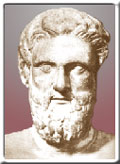Aristophanes(c.
448 - 385)One of history's
greatest comedy writers, Aristophanes is still a major source of inspiration
to many modern writers.
He was born in Athens and his fathers name was Philippos. He was well educated
and is believed to have owned property on the island Aegina. His three sons,
Philippos, Araros and Nikostratos, were all to be comic poets.
Aristophanes was a conservative, favoring aristocratic to democratic rule,
and was against reform and novelty. He preferred philosophy and theology in
opposition to the new ideas of the Sophists.
Eleven of his works have survived, but he is believed to have written over
40 plays. The three first plays he wrote were written under a pseudonym. One
was The Achamians (425 BC) where he begs for an end of the war against Sparta.
The first work under his real name was The Knights (424 BC), a satire of the
Athenian politician and military leader Cleon. The Clouds (423 BC) was a satire
about Socrates, whose ideas, he believed, where against the interests of the
state.
The Wasps (422 BC) was a satire of the justice courts, The Peace (421 BC)
was another plea for peace with Sparta and The Birds (414 BC) was a satire
on the Athenian fondness of litigation.
One of Aristophanes' most famous works was Lysistrate (411 BC) where women
make a sex-strike in order for their husbands to stop making war. In Thesmorphoriazusae
(411 BC) and The Frogs (405) he attacked the playwright Euripides. In Ecclesiazusae
(393 BC) he attacks the idea of communal ownerships of property, and Plutus
(388 BC) criticizes the concept of redistribution of wealth in Athens.
Aristophanes works were written in a less strict language and include dialogues,
choral parts, lyric scenes and a lot of music and dance. They were directed
to the Athenian audience, and became out of fashion even in ancient times,
since they were concerned with public figures and their doings.
The Wasps (422 BC) was a satire of the justice courts, The Peace (421 BC) was another plea for peace with Sparta and The Birds (414 BC) was a satire on the Athenian fondness of litigation.

